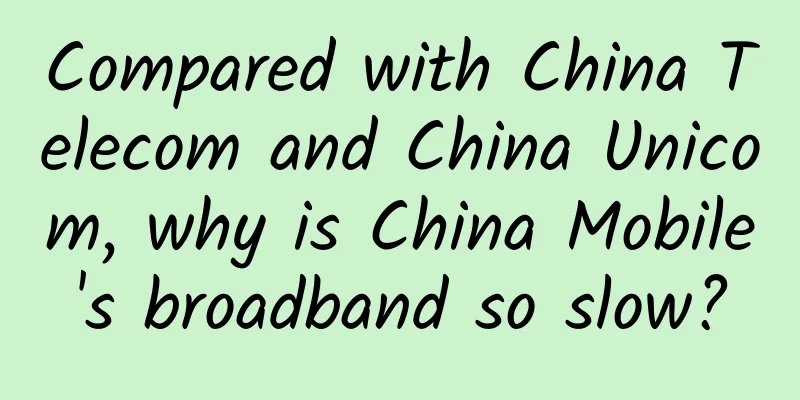Compared with China Telecom and China Unicom, why is China Mobile's broadband so slow?

|
If you have been using China Telecom or China Unicom broadband before, and suddenly use China Mobile broadband, you will basically feel that the speed of China Mobile broadband is slower with the same bandwidth. Why is this? This requires mentioning the difference in the broadband identities of China Telecom, China Unicom and China Mobile. "China Telecom in the south, China Netcom in the north" actually reveals the geographical distribution of my country's Internet access services. China Telecom enjoys a regional monopoly advantage in the southern market, while China Unicom (China Netcom) enjoys a regional monopoly advantage in the northern market. The identities of the two companies in broadband are my country's first-tier broadband operators, which can also be understood as the country's general wholesalers. Although China Mobile also operates broadband services, and its prices seem to be more favorable than those of China Telecom and China Unicom, many people believe that China Mobile operates the same broadband services as China Telecom and China Unicom. In fact, as mentioned earlier, if China Telecom and China Unicom are the country's general wholesalers, then China Mobile can be said to be the largest distributor under the general wholesaler, and is a second-tier broadband operator in my country. The picture below clearly shows that the broadband we usually talk about actually contains multiple layers of relationships behind it. As a second-tier or third-tier broadband operator, they actually rent the network of China Telecom or China Unicom, and then design new services to sell to users. A key point here is that their costs are actually higher than those of first-tier broadband operators, so they need more users to spread this cost in order to generate profits. Therefore, when a limited broadband continues to increase users, the average bandwidth provided to each user is pitifully small. Regarding this point, I believe that it is more obvious during peak Internet access hours and when BT downloads and Thunder downloads are turned on. Another point is that, although both companies provide broadband Internet access services, in the face of competition, China Telecom and China Unicom will definitely give priority to their own users’ Internet access and communication needs. Even the largest distributors have to follow this “unspoken rule”. |
<<: Ruijie SDN Open Network Platform ONP won the "2016 Most Innovative Award"
>>: 2017 Prediction: SD-WAN will drive the development of IoT
Recommend
UFOVPS limited 30% off, Japan/Hong Kong CN2 GIA/US high-defense VPS monthly payment starts from 26 yuan, top up 200 yuan and get 20 yuan
UFOVPS has launched a promotional event during th...
Take you to quickly understand: leaky bucket and token bucket algorithm in current limiting
[[346652]] This article is reprinted from the WeC...
5G commercialization is advancing rapidly, accelerating scale development and empowering thousands of industries
Mobile substation is a kind of factory-prefabrica...
Juniper CEO: The strategy driving Juniper's general direction is cloud
Juniper announced its first quarter 2017 revenue ...
HTTP 2.0 Interview Pass: Mandatory Caching and Negotiated Caching
[[413787]] This article is reprinted from WeChat p...
2017Q1 China Wireless Router Market Research Report
With the popularity of WiFi and mobile devices, w...
Industry hot spots of data center in 2018
For many people, 2017 has been an intense and bus...
What you don’t know about 5G
Having said that, the 5g era has been here for tw...
3 Types of Wireless Network Site Surveys and How to Perform Them
Designing and maintaining a network is complex, b...
From trials to use cases, the big 5G stories of 2017
In 2017, 5G gradually moved from the laboratory t...
Ruijie Smart Town E-Day Tour
[[254402]]...
Ruijie Networks Creates China's First Wireless Office Wi-Fi for "Medical Innovation Space"
In the "Precision Medicine Baccarat" pu...
IoT smart home solutions create intelligent products based on scenarios
"Connected World: Smart Homes Are Key to Fut...
Daily Algorithm: Stair Climbing Problem
[[433205]] Suppose you are climbing a staircase. ...
Three things to consider before building a data center
90% of the world’s data was created in the past t...









